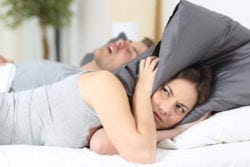Do you snore during sleep? Is trouble breathing keeping you up at night?
Although snoring alone is not a cause for alarm, snoring in conjunction with other symptoms may be a sign of an undiagnosed sleep disorder. If you or someone you love experiences loud snoring during sleep, you may want to get screened for sleep apnea. Sleep apnea is a life-threatening sleep condition that should be addressed by a specialist as soon as possible.
Sleep apnea can have detrimental effects on your overall health if left untreated. The most common type of sleep apnea called Obstructive Sleep Apnea (OSA) can increase your risk of stroke, heart attack, and other systemic diseases. Finding the right solution to alleviate your symptoms and restore your quality of sleep can improve your overall health. Dr. Joyce Kim can treat your sleep apnea symptoms and provide affordable sleep apnea treatments for all ages.
What Is Sleep Apnea?
Obstructive sleep apnea is a sleep disorder that occurs when the soft tissue in the back of the throat collapses, causing a restriction in airflow through the nose and mouth. The lack of oxygen can affect vital organs in your body and may cause a wide range of health concerns.

Common Signs & Symptoms of Sleep Apnea
Patients with sleep apnea may experience restlessness, difficulty concentrating, and sleepiness throughout the day.
Patients with sleep apnea may also experience:
- Loud snoring
- Gasping for air during sleep
- Irritability
- High blood pressure
- Headaches or migraines (especially in the morning)
- Depression
- Dry mouth or a sore throat
- Chronic fatigue
If you are experiencing any of these signs or you have a formal diagnosis for sleep apnea, please disclose this information during your visit. If you notice you or a loved one is experiencing any of these signs, a proper diagnosis and treatment plan is a necessary part of restoring your health and quality of sleep.
Sleep Apnea FAQs
Sleep apnea can be extremely dangerous if you don’t seek treatment. Read the answers to these frequently asked patient questions.
How can sleep apnea impact my life?
Untreated sleep apnea can lead to serious health complications. It increases the risk of high blood pressure, heart disease, stroke, type 2 diabetes, and irregular heartbeat. Chronic fatigue from poor sleep can also lead to accidents and a decreased quality of life. Timely diagnosis and treatment significantly reduce these risks.
Does sleep apnea get worse with age?
Sleep apnea can either develop or worsen with age. As we age, we lose muscle tone all over our bodies, including our airways and the muscles around our throats and mouths. This makes it more likely for the soft tissue to collapse into the back of our throats.
Is sleep apnea considered a disability?
Sleep apnea alone isn’t considered a disability by the Social Security Administration. However, some conditions that may qualify can occur in tandem with sleep apnea. Heart problems, mental issues, and more may qualify as disabilities.
Can losing weight help with sleep apnea?
Yes, weight loss can significantly reduce the severity of obstructive sleep apnea or even eliminate it in some cases. Excess weight, especially around the neck, can increase airway obstruction during sleep. Healthy lifestyle changes such as diet, exercise, and avoiding alcohol can contribute to improvement. Even modest weight loss can make a noticeable difference in symptoms.
Can children have sleep apnea?
Yes, children can develop sleep apnea, often due to enlarged tonsils or adenoids. Symptoms in kids may include snoring, restless sleep, bedwetting, behavioral problems, and learning difficulties. Treatment options may involve surgery (such as tonsillectomy), oral appliances, or CPAP therapy in more severe cases.
Is sleep apnea curable?
Sleep apnea may not be “curable” in all cases, but it is highly manageable with the right treatment. Some people with mild apnea may improve significantly through weight loss or lifestyle changes. Others may need long-term use of a CPAP machine or an oral appliance. Surgery can resolve the condition permanently in rare cases, but ongoing monitoring is often necessary.
Treating Sleep Apnea in Williamsport, PA
Most patients do not realize they have sleep apnea until they visit a specialist. Many signs of sleep apnea may mimic other health concerns, so patients don’t realize they may need to visit a sleep specialist. Receiving treatment for sleep apnea is vital to maintaining optimal overall health. In severe cases of sleep apnea, patients may take pauses in breathing during their sleep, which can restrict oxygen flow to the vital organs in the body.
Our team at Loyalsock Dental in Williamsport, PA offers oral appliance therapy for patients with sleep apnea. Our goal is to alleviate the symptoms of sleep apnea and allow patients to get the rest they need.
The most traditional treatment option for sleep apnea is the CPAP machine. However, oral appliance therapy has been proven to be an effective, comfortable solution for treating sleep apnea. The oral appliance is similar to a mouthguard and is designed to realign the jaw to allow a healthy, adequate amount of oxygen flow. Dr. Kim will take impressions of your teeth, gums, and mouth to create a custom-designed sleep appliance. Patients should wear their oral sleep applicate to promote healthy breathing and reduce symptoms of sleep apnea.
